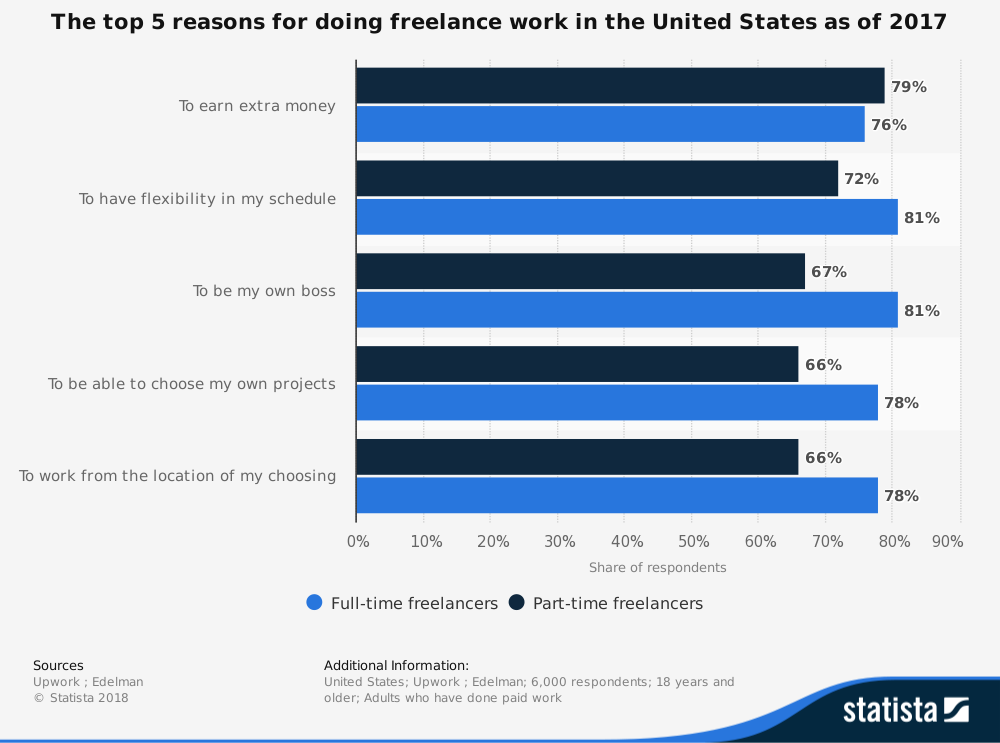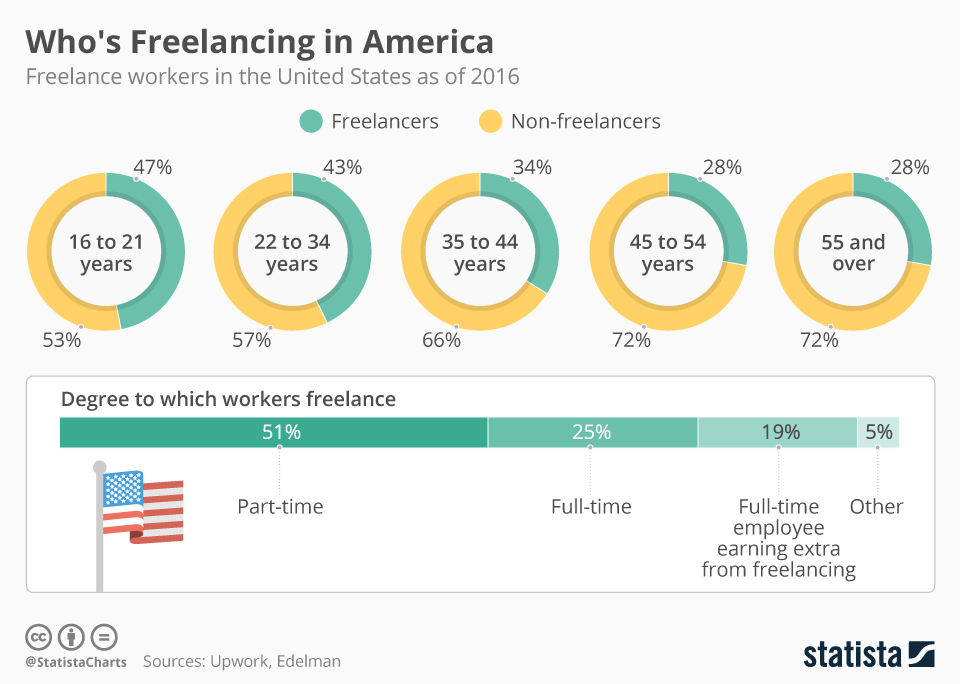A recent report predicts that by 2027, the number of freelancers will make up about 50% of the US workforce, at 86.5 million. Although the global workforce has evolved considerably in the past decade, this report represents the dynamism of the current generation of professional workers. It also points out how independence of work seems to top all other benefits that corporate environments bring with them. Young workers are increasingly choosing the flexible work environment, which seems to offer personal and professional satisfaction unmatched by regular full-time jobs. Moreover, it is more noticeable than ever that freelancing has become a sustainable secondary or, in many cases, the primary source of income.
In a time when freelancers are making it big as web developers, data scientists, technical and scientific writers/editors, or market research consultants, it is tempting to ask whether doing a regular full-time job at one company is worth the time and energy. While breaking away from the 9-to-5 schedule has become a hit among workers both young and old, there are multi-level challenges regarding long-term financial stability, medical insurance and other health benefits that freelance workers have to deal with. But what is the reality at the grassroots level? What do the job satisfaction indices point at? Here is an analysis of how the gig economy is changing the future of work.
1. Freelancing allows you to focus on personal career goals
Usually, when young people start their careers, they have a list of career goals that they want to accomplish in their lives: from learning programming languages to becoming watersport instructors. Freelancing provides the opportunity for young people to pursue those goals, especially when they are new in their careers and might not have too many financial liabilities. In today’s age of collaboration and interdisciplinarity, it is necessary to upskill and learn new things on a daily basis, both within and outside of our careers. For example, a PhD graduate working on electronic devices might want to study bioinformatics. Choosing to freelance can be a great option in such a situation because freelancers are free to choose their schedules and workloads.
Freelancing helps experienced professionals helps tailor their work hours and skills in relation to the number of years they would like to keep working. It’s also possible that corporate workers choose to become freelance workers after reaching a certain age, say 40 or upwards, which not only makes the first steps of establishment much easier but also lets them choose who they want to work with and how much work they want to do. Some reasons that corporate workers turn to freelancing also include falling job security, changes in immigration laws, reduced employee benefits, etc.

2. Freelancing provides a safety net
There’s a huge probability that the current job you’re doing isn’t the best fit. However, you cannot think of making the career shift of your choice because of some necessary financial requirements. Starting to freelance in a domain you’re skilled in can help reduce the stress in many ways. It’s also the option a lot of professionals are shifting towards because of the reduced job security that regular jobs lack today. Companies are changing their manpower management tactics, the number of work-hours is increasing while the attrition rates are rising. This pushes skilled professionals to take up freelancing as a career option besides their regular jobs in order that stressing periods at work don’t throw them into a burnout zone.
This shift in the minds of corporate workers has affected the overall quality of the current American workforce. Young minds are becoming more active as freelancers in the evenings instead of spending hours after work with their colleagues. More and more young professionals are creating freelancer profiles on websites like Upwork, Toptal, and Kolabtree, working on developing their overall work experience and skillset instead of socializing with their peers.
3. Rising Concerns About Professional Risk Assurance & Safety
More than 129 million workers in the U.S. are covered by worker’s compensation, according to NELP, but many companies in the gig economy do not provide it because their workers are classified as independent contractors. Although this is a concern well-discussed with regard to gig workers in the US, such as those working as delivery agents, door-to-door salespersons or for ride-sharing cab companies, the concerns are similar for freelancers as well. When freelancing professionals work on projects that take them to distant locations or to unknown website databases, they are completely out on their own and are at risk of accidents, hacking or unwarranted property damage. These risks are quite real and freelancers have to prepare for them without their careers being affected badly.
However, many companies are including their freelance workers in their employee base and assisting them with medical & accidental risk insurance benefits. The downside is that such companies are limited in number and may only be present in certain cities.
Freelance scientists are the latest entrants into this parallel realm of employment. Although it was hardly imaginable in the past, science workers now comprise roughly 16% of gig workers. Freelance data scientists are the leaders in this space, comprising about 10% while scholars from other disciplines are soon gaining a vast prominence. What affects the freelance workers in this space is that they need to remain connected with colleagues in their field. They also might require government or external funding. Data science is, by far, the most lucrative area of freelance work than other science, technology, engineering and medicine related fields.
Independent working is not a difficult possibility for technology majors, who need not more than a computer system and a couple of programming languages set up on it. Similar case for writers, editors, market research analysts and scientific illustrators as well. But how they carve out their niche and grow their ambitions is totally a skill that depends on personal caliber as well as access to the right platforms. What is intriguing to note is the pace in which scientists, market research consultants, trainers, and app/web developers have risen as freelancers/independent workers, which clearly points that freelancing is surely going to remain as one of the viable career choices in the future. This sustainability + flexibility combination is playing out well in both the US and Europe.

Overall, the change is positive and is leapfrogging ahead. It all boils down to how freelancers are regarded by organizations. Are they considered as constitutive employees of the organization or is the communication with freelancers just about the work and project completion, targets and deadlines? In the years to come, freelancers would like to expect more “inclusiveness” that traditional employees enjoy. They may also be able to remain loyal to the organizations they work for, even if it is on a contingent-work basis. The success of the freelance economy, although a tough bet to consider now, may fuel the concept of self-employment in the minds of the future generations to come, given the rise in the demand of niche skillsets.







